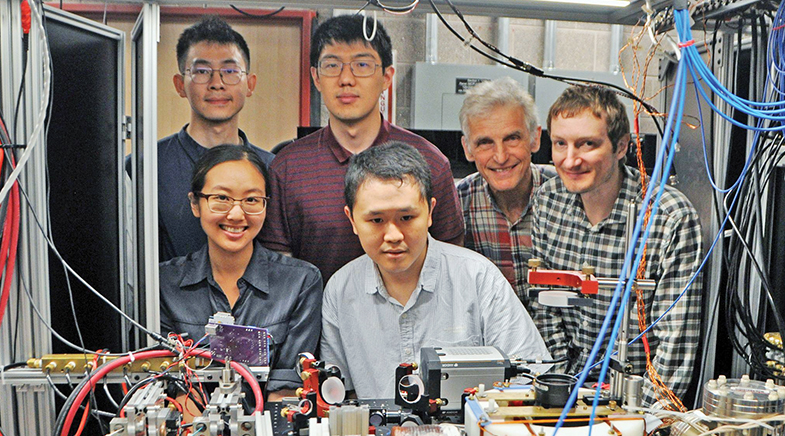Support systems for start-ups
-
- from Shaastra :: vol 03 issue 11 :: Dec 2024 - Jan 2025

For entrepreneurs working on deep tech, an incubator ecosystem provides support, mentorship – and access to funds.
Until about two decades ago, the University of Hyderabad worked like a traditional Indian university. Its faculty taught the usual courses in sciences and humanities and did research at an advanced level. The university had the odd start-up, but entrepreneurship had not seeped into its culture. The institution was well regarded, but few considered it a place for future entrepreneurs.
In 2018, the university started ASPIRE-BioNEST, an incubator to provide space, support, and mentorship to entrepreneurs working in life sciences. Since then, ASPIRE-BioNEST has incubated more than 60 start-ups, working in areas as diverse as molecular diagnostics, drug discovery, and plant-based proteins.
ASPIRE-BioNEST is not the only incubator in the area. The campus itself has two more: ASPIRE-Technology Incubation and Development of Entrepreneurs, which supports start-ups in electronics and information technology, and ASPIRE-Technology Business Incubator, which helps start-ups in pharma, chemistry, and renewable energy. If you were to move just a few kilometres from the university's campus in any direction, you would see more such incubators. There is DLabs in the Indian School of Business campus; the Indian Institute of Technology (IIT) Hyderabad Technology Incubation Center (iTIC), the Atal Incubation Centre-Centre for Cellular & Molecular Biology (AIC-CCMB), and the expansive Technology Hub (T-Hub), founded by multiple institutions and the Telangana government.
Over 300 deep tech start-ups were set up in Indian cities in 2023. Incubators and accelerators help make these cities hubs for deep tech entrepreneurs.
This network of incubators supporting deep tech start-ups is not exclusive to Hyderabad either. Similar institutions exist in Bengaluru, Chennai, Delhi-NCR, Pune, and Mumbai. According to NASSCOM'S Indian DeepTech Startup Landscape Report – 2023 (bit.ly/nasscom-deeptech), more than 300 deep tech start-ups were incepted in Indian cities in 2023 alone. The incubators and accelerators are a key factor in making these cities a hub for deep tech entrepreneurs.
The earliest incubators were established in India in the early 2000s by the Department of Science & Technology. Their number grew significantly between 2010 and 2020. By the end of 2020, there were 731 incubators in India. In 2024, the number rose to 1,100, according to the India Incubator Kaleidoscope 2024: Democratising Entrepreneurial Dreams report, published by researchers from the Indian Institute of Management Bangalore (IIM-B) and IIT Madras. The report also notes that the proportion of start-ups that get funded is about 2.5 times higher in incubation centres than those outside. Overall, only 8.2% of all start-ups get incubated (bit.ly/India-Incubator).
However, the incubation rate is over 12% in sectors such as artificial intelligence and machine learning, data analytics, biotech and defence technology. Incubator support is especially important in the deep tech sector, where start-ups have long gestation periods and require access to technological infrastructure to develop their products. Incubators, whether in an academic environment or hosted by public or private enterprises, do not just provide workspace to start-ups. They deliver a support system that improves their access to mentorship, infrastructure, and investments.
FUNDING FOR DEEP TECH
In 2013, when the genetic diagnostics company MedGenome was set up, its founders had to invest their own money in the venture. "There was no funding at all," recalls Mahesh Pratapneni, one of the founders. The MedGenome example was common in the start-up scenario until then. However, the situation started changing roughly around the time MedGenome was founded.
In 2012, the Department of Biotechnology set up the Biotechnology Ignition Grant (BIG) to fund ideas that were unproven and too risky for private investors. BIG has funded more than 900 start-up ideas since then. Over time, other schemes such as the Startup India Seed Fund Scheme and Innovations for Defence Excellence (iDEX) were added to the portfolio of seed funds available for early-stage and deep tech ideas. Many of these grants are delivered via incubators.
Setting up within an incubator improves the chances of an early-stage grant. Incubators help start-ups navigate the process of raising venture funds, too.
An example is Serigen Mediproducts, a Pune-based tissue regeneration start-up. Founded in 2015, Serigen got its BIG from BIRAC (Biotechnology Industry Research Assistance Council). By 2021, the start-up had raised ₹3 crore from other grants. Serigen went on to raise a seed round of ₹5.8 crore from private investors in 2023, but the initial grant money was critical to its success. "If we had not received the grants in the early stages of our product development and validation, it would have been extremely challenging for a deep tech start-up like ours to survive," says Anuya Nisal, Founder and CEO, Serigen.
Setting up within an incubator is a good way to improve the chances of an early-stage grant. Remaining within the incubator also helps start-ups navigate the process of raising venture funds. "We try connecting with prospecting investors," says Y.N.S. Harshita, Incubation Manager at ASPIRE-BioNEST. "We organise investors’ meets and conduct sessions where somebody working at an investor firm guides them on how they should pitch (an idea) to an investor."

Because of its long gestation period and high failure rates, the deep tech sector often found it challenging to raise funds. However, a subtle shift in the funding environment has begun, although the sums of money raised do not reflect this shift yet. There is broad acceptance that the deep tech sector requires large, patient capital, the industry jargon for long-term investments. Venture funds focused exclusively on deep tech start-ups have been set up (Fuel for take-off and India is poised for a tech leap), and several large investment funds and family offices are setting their sights on deep tech start-ups.
"Almost every week, a VC (venture capital) firm or angel investor approaches us to connect them with start-ups in an area they are interested in," says Rohit Thakur, Manager – Ecosystem at iTIC, Hyderabad. Manu Iyer, Partner of the Chennai-based Bluehill Capital, stresses that the seed and early-stage funding ecosystem for such start-ups has improved over the last couple of years, and more mainstream venture capitalists are betting on the sector. "Raising ₹1-3 crore in deep tech ventures is easy now," he says.
Large funding and late rounds, however, continue to be a rarity in the deep tech sector. "Once the business becomes interesting and the company starts earning revenues, it opens the doors to all kinds of investors," says Manish Singhal, Founding Partner, pi Ventures. "Start-ups should turn from a technology narrative to a business narrative with seed funding. Then the gate opens up. There is large capital available for the growth phase. The problem arises only when the deep tech ventures are not able to convert to a business narrative," he adds.
MARKET-READY STAGE
After infrastructure and funding, start-up founders faced substantial obstacles in taking a prototype to the market-ready stage. Although some incubators have the infrastructure for making product prototypes, larger facilities to bulk-manufacture a product have been missing in start-ups. "We have a major gap in manufacturing," says Ramjee Pallela, Chief Operating Officer, AIC-CCMB. Some larger prototyping facilities, such as T-Works in Hyderabad and the Andhra Pradesh MedTech Zone (AMTZ) in Visakhapatnam (Medtech mall) serve the manufacturing requirements to some extent but are insufficient for the community. The diversity of new products, from med tech to semiconductors to other fields, poses another set of problems, as each type of product needs specialised production facilities.
"Incubators and accelerators need to be subject-specific to be able to adequately serve the needs of a start-up," says Sushmitha Sundar, Head of Life Sciences at the Research and Innovation Circle of Hyderabad (RICH). "I feel each incubator should have its own core competency and be willing to collaborate with each other for the complementary needs of the start-ups."
In the biotech sector, the Central government's newly launched Biotechnology for Economy, Environment and Employment (BioE3) policy is an attempt to address the challenges of manufacturing. Under this scheme, the government wants to establish bio-foundries and manufacturing facilities for start-ups. "Once such facilities are available, start-ups can use them to scale up their manufacturing activities," says Harshita of ASPIRE-BioNEST.
Entrepreneurs in deep tech may have a technical background but may lack an understanding of the business side of their product and market needs.
Industry is collaborating, too. The IKP Knowledge Park in Hyderabad is partnering with industry to set up IKP Growth Labs, which will help with pilot facilities and manufacturing facilities. Deepanwita Chattopadhyay, Chair and CEO, IKP Knowledge Park, refers to the IKP Growth Lab set up at the Chandigarh plant of Tynor Orthotics, which makes medical devices such as belts, collars, ankle guards, and grips. Tynor has a huge assembly line and a good understanding of materials. They can guide a start-up on what kind of material it should use, and the regulation that needs to be followed. There is a vast difference between building a prototype in an incubator and doing so on an assembly line. "We are trying to give our start-ups that experience," she says.

In addition to access to manufacturing spaces, entrepreneurs need market linkages and hand-holding through the regulatory guidelines to produce a market-ready product. The regulatory landscape is especially important in the life sciences sector, where products may undergo clinical trials. In some emerging areas, regulatory guidelines are not clear and the regulators themselves need to learn about them. Many incubators and accelerators help entrepreneurs connect with regulators to iron out problems. Hyderabad's RICH, for example, organises a session every other month where their entrepreneurs interact with officers of the Central Drugs Standard Control Organisation (CDSCO). Each start-up gets to spend time with the assistant drug controller and have their queries answered.
At NSRCEL, the start-up incubator of IIM Bangalore, Micelio, an electric vehicle platform, helps start-ups with contextual knowledge and technical infrastructure in the electric mobility field, and the Automotive Research Association of India guides them on testing and compliance. "This gives founders a great opportunity to seamlessly straddle across business, technology, and regulatory contexts while iterating on their ideas," says Anand Sri Ganesh, Chief Executive Officer, NSRCEL.
COACHING ENTREPRENEURS
Many entrepreneurs in deep tech have a technical background. However, they often lack an understanding of the business side of the product and market needs. Sometimes, even with mentorship, the "coachability" of founders is "a major challenge" in deep science, says Pallela. "And that's why Design Thinking programmes and other boot camps are very important."
In areas such as med tech, clinician feedback on whether they see value in the product is an important part of being market-ready. Sundar mentions start-ups that fail at TRL 4-6 levels (Start-ups born on campuses) because they did not adequately understand market needs. "Sometimes, start-ups do not want to hear that their product is not acceptable to the market," says Sheeba Khan, CEO, Atal Incubation Centre at Shiv Nadar University, Delhi NCR. To achieve the right product-market fit, a number of iterations may be required. "Sustaining a (deep tech) start-up requires long-term efforts and a lot of patience. Those who are able to do it, they're doing good business. They're surviving," she says. "They may not be a unicorn, you may not hear about them in the news, but they're surviving."
See also:
Indian start-ups dive into deep tech phase
Fuel for take-off
Start-ups born on campuses
Bridging the academia-industry gap
Space start-ups get into a higher orbit
Outlook positive
Chipping in
The rise of quantum.in
Automated growth
India is poised for a tech leap
Have a
story idea?
Tell us.
Do you have a recent research paper or an idea for a science/technology-themed article that you'd like to tell us about?
GET IN TOUCH














